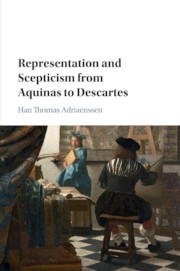Book contents
- Frontmatter
- Contents
- Acknowledgements
- List of Abbreviations
- Introduction
- PART I THE VEIL OF SPECIES
- PART II THE VEIL OF CARTESIAN IDEAS
- 4 Transformations of Cartesianism: Malebranche and Arnauld
- 5 Ideas and Objects in Desgabets's Radical Cartesianism
- 6 The Solid Philosophy of John Sergeant
- PART III REPRESENTATIONS AND SCEPTICISM
- Conclusion
- Bibliography
- Index
5 - Ideas and Objects in Desgabets's Radical Cartesianism
from PART II - THE VEIL OF CARTESIAN IDEAS
Published online by Cambridge University Press: 13 July 2017
- Frontmatter
- Contents
- Acknowledgements
- List of Abbreviations
- Introduction
- PART I THE VEIL OF SPECIES
- PART II THE VEIL OF CARTESIAN IDEAS
- 4 Transformations of Cartesianism: Malebranche and Arnauld
- 5 Ideas and Objects in Desgabets's Radical Cartesianism
- 6 The Solid Philosophy of John Sergeant
- PART III REPRESENTATIONS AND SCEPTICISM
- Conclusion
- Bibliography
- Index
Summary
Towards the end of the seventeenth century, the Cartesian way of ideas came increasingly to be seen as a source of scepticism. But although there were many who raised the spectre of scepticism for Cartesianism, few were as adamant as the French Academic, Simon Foucher (1644–1696). The author of over a dozen tracts on knowledge and scepticism, Foucher was relentless in confronting the Cartesians with what he found were the sceptical implications of their way of ideas. Time and again, Foucher would argue that ideas in the Cartesian mind can teach us nothing about bodies, and that from behind the veil of representations, we can only guess about what the world is really like. And if the steady flow of Foucher's own publications would arguably have been enough, all by itself, to put Cartesianism under serious pressure, his challenges to Descartes's system were moreover being picked up by later authors, including influential writers such as Bishop Pierre Daniel Huet and the Parisian scholar Jean Duhamel. This, historians have argued, allowed Foucher's provocations to make a defining impact on the French reception of Cartesianism, which Richard Watson has famously summed up in the claim that it was Foucher's critical questions that led to the gradual erosion, and eventually to the breakdown of, the Cartesian way of ideas.
But Foucher's questions did not remain unanswered. And the first Cartesian to extensively engage Foucher's challenges to Cartesianism, was the Benedictine theologian Robert Desgabets (1610–1678). In a detailed rebuttal of Foucher, Desgabets argued that there is a secure route from ideas to external reality, and that this route was in fact more straightforward than even Descartes himself had seen. The fact that Desgabets was the first to seriously take up Foucher's challenges on the Cartesians’ behalf, makes it important to explore how he develops his account of ideas, and how he thinks the representations in our minds can be tied to external objects in such a way as to silence the kind of sceptical doubt voiced by Foucher.
Moreover, Desgabets provides one of the most interesting cases of a Cartesian philosopher hoping to address the difficulties surrounding ideas by combining Cartesianism with much older philosophies.
- Type
- Chapter
- Information
- Representation and Scepticism from Aquinas to Descartes , pp. 169 - 197Publisher: Cambridge University PressPrint publication year: 2017



